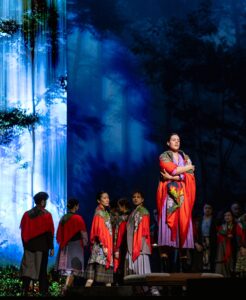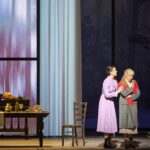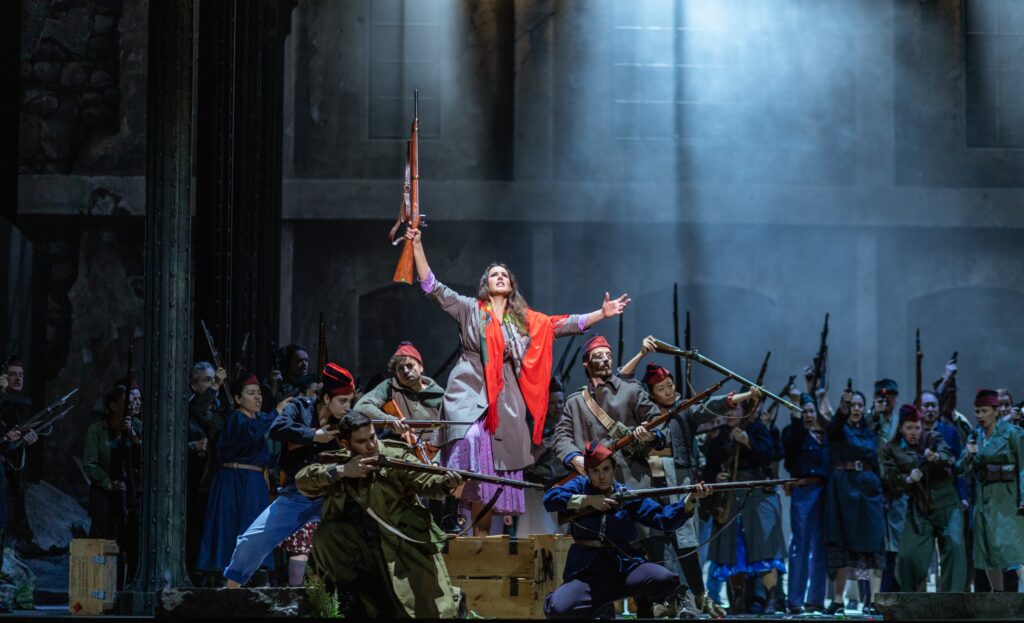How do you stage Bellini’s Norma, the story of a Druid priestess, way back in Roman times, who’s fallen in love with a Roman pro-consul, and with two children by him. Imagine him, Pollione, in a toga? Or this being Vienna State Opera, allow a flash designer to go modern, lots of bling? Designer military, a trip into the future, a fictional history?
At least it’s staged, on my last visit, (2014), it was a Konzertant, a platformed rostrum performance- in evening dress, with no scenery. And the story is complicated enough. The focus is on a love triangle, Norma-Pollione-Adalgisa.
 Actually, Juan Diego Florez as Pollione is wearing black leather, close-fitting, belted, and with smart trousers. He’s supposedly a pro-consul, but there’s no insignia to indicate his high rank. Hence dishonor, and consequent fall from grace, in his secret affair with a Druid priestess, and even with her altar maid. Federica Lombardi mostly wears subtle, floral-patterned long dresses, and orange-red scarves, color-coded as revolutionary. But not the white lace or taffeta we’d expect for a religious order. (Adalgisa, her rival for Florez’s love, is modestly dressed in a dowdy long skirt.)
Actually, Juan Diego Florez as Pollione is wearing black leather, close-fitting, belted, and with smart trousers. He’s supposedly a pro-consul, but there’s no insignia to indicate his high rank. Hence dishonor, and consequent fall from grace, in his secret affair with a Druid priestess, and even with her altar maid. Federica Lombardi mostly wears subtle, floral-patterned long dresses, and orange-red scarves, color-coded as revolutionary. But not the white lace or taffeta we’d expect for a religious order. (Adalgisa, her rival for Florez’s love, is modestly dressed in a dowdy long skirt.)
We first see Pollione in the middle of a forest with Flavio (cute-looking Hiroshi Amako). Are you in love with another, he pointedly asks. We see Florez, here somewhat over-dressed in an elegant camel coat. He sings, Norma’s anger was revealed to him in a dream. I was standing with Adalgisa at the temple of Venus- orchestra jaunty, syncopated- intoxicated with love and desire. Then a shadow comes between us. He’s enveloped by a druid’s cloak. Cymbals and chorus build-up to anticipate Norma’s arrival. (This terrible indiscretion will ‘spook the temple.’) There’s one shot of Florez lying with Amako, perhaps suggesting an illicit relationship,(Roman times?), but that’s way too complicated.
In Act 1, Oroveso, Norma’s father, addresses the Druid rebels, not to act without without divine approval. When the moon rises, Priestess Norma will proclaim the divine will. (Druids invoke their god of war to give the signal.) ‘They’ll drive the hated Romans out of Gaul.’
Ildebrando D’Arcangelo (Oroveso) is a formidable bass. But here the Gauls’ spiritual leader wears a rag-bag of gypsy clothes and looks like ‘Fiddler on the Roof’, rather than a High Priest.
What’s seriously wrong with Cyril Teste’s production (stage Valerie Grall) is the giant videos used to tell the back story. We might as well be watching in a cinema. All very exciting, but not really connected with the narrative, of Bellini’s opera Norma, libretto by Felice Romani.
We see constantly video clips of refugees. Then, Florez’ Pollione with his two children. Florez is sympathetically depicted as the loving father, hugging them in a family circle. In fact, they’re illegitimate – hidden away in the temple- a shameful secret. This Roman philanderer can’t keep it in his trousers.
The videos tell another story of displaced refugees, a modern war front. They distract from the opera. Bellini’s own music -and Romani’s text- should do that. Richard Wagner is quoted of Bellini’s music, ‘Melodies as beautiful as you could ever dream of.’
Most famously Casta diva. With the moon’s coming out will Norma announce god’s will. Oroveso announces Norma, her hair wreathed in verbena, ‘the snake she’s holding in her hand gleamed.’ But not in tonight’s production. Federica Lombardi’s Norma wears a green shot-silk gown, For Norma the time for revenge has not arrived. Casta diva sings, Keep the peace, temper their zealous hearts; spread on earth the same peace as prevails in heaven.
Lombardi pays tribute. ‘The ‘spirit of the greatest diva of all time sweeps over casta diva.shimmering, a melody that brings hope: a prayer, an ode to freedom, Lombardi’s expressive, soaring soprano, inspired by Callas, is impressive. (But she’s no Callas.)
 Norma appears before her people, prophesying the downfall of Rome. ‘One day it will die, it will perish of its own vices’ She compels the Gauls to join her prayers to the moon goddess with a plea for peace.
Norma appears before her people, prophesying the downfall of Rome. ‘One day it will die, it will perish of its own vices’ She compels the Gauls to join her prayers to the moon goddess with a plea for peace.
The holy rites over, the orchestra has a military swagger- ‘when the gods demand the Romans’ blood, let the first blow fall’. But Norma sings she’s unable to punish him, the Roman’s blood. Norma’s inner conflict is between duty and her private passion. ‘Ah, bello a me ritorna, bring back the beauty of our first love. ‘I will be your defense against the world.’
Adalgisa’s smouldering Act1 aria (soprano Vasilisa Berzhanskaya) sings of betrayal. How that Roman made her transgress her vows! But an irresistible force drives her back for more. She’s lost, take pity on her. Vasilisa’s clothes, colorful, but drab, hers is a heart-rending performance, a diva’s technique, but used with modest restraint.
Pollione appears, Florez on fiery form, (she should pray to the god of love, not to the altar.) And what of our love? She’s renounced it. – Go heartless woman! Offer your cruel god my blood as sacrifice.’ Then he retracts. He cannot leave, she alone was promised. She sings of the grief he’s caused her. But Florez, his fabulous tenor rising, Would you really leave me, Algadisa?
Norma confides her fears to Clotilde that she’s losing Pollione. And in their dramatic duet, Adalgisa confesses to Norma that she’s in love. To Adalgisa’s surprise, Norma releases Adalgisa from her novice’s bonds. But it emerges they’re in love with the same man! Pollione, the father of Norma’s children. Adalgisa accuses Pollione of deception; Norma curses him. This is a tremendous scene, with both sopranos firing each other to greater vocal heights. Such passionate intimacy, in operatic duet, does not need props, and certainly not giant video screens.
In Norma’s Act 2 aria Dormono entrambi, at the heart of the opera, Norma looks on her children.’ Have no remorse. Murder my children, the joy of my life. They must die, she sings. Either slain by the Gauls, or ‘worse than death’, enslaved by the Romans. But they’re also her children! So Norma entrusts them to Adalgisa, as stepmother. She will confess her shame. Norma, orders her, take them to him, he’ll maybe a better husband for you, and his children. She begs Adalgisa, protect them. In subtle, homely lilac-green floral print, Lombardi’s warmly lyrical soprano registers a mother’s heartbreak at giving away her children.
And with grim passion, Lombardi sings of Norma’s revenge. ‘This godless man has betrayed my heart!’. In this harrowing scene, Norma is eventually, reluctantly persuaded to trust Adalgisa. The two erstwhile rivals swear their friendship. ‘You have won, embrace me!’ Norma concedes, Lombardi and Vasilisa hug, united in a sisterly gesture.
In contrast to Norma’s Act 1 Casta diva, addressing her people now, her soprano rises, Roman blood will flow like a river. Crashing percussion, the bell is sounded. What, a bloodbath? Guerra! Chorus demand to know what’s happened, previously she called for peace.
The stage is filled with guerilla fighters, their rifles raised. Lombardi, bright red scarf over camouflage trench coat, Norma the revolutionary, proclaims, ‘Now massacre and death. War!’ Who will the sacrifice be? Pollione is arrested for abducting Adalgisa, she punished for adultery.
In Norma’s scene with Pollione, he in her hands, is offered his freedom if he gives up Adalgisa. Pollione defiantly refuses, (no one can break their bonds.) But Norma’s wrath is greater than his love.
The Romans slaughtered in their hundreds. ‘Kill me, save her! A perjured process!’ Norma steps in for Adalgisa, offering to be executed in her place. ‘She is guiltier than guilty.’ Pollione’s love is re-kindled by Norma’s self-sacrifice. She confesses she’s a mother, but Orevoso will save her children.
Out of this costume chaos, and distracting, video effects, the music prevails. The star-filled roles, superb Vienna State Opera Chorus and orchestra under Michele Mariotti, justify Bellini’s opera. © PR. 12.3.2025
Photos © Juan Diego Florez, as Pollione © Wiener Staatsoper/ Sofia Vargaiova; Federica Lombardi as Norma, ensemble © Sofia Vargaiova/ Wiener/Staatsoper
Photos © Federica Lombardi (Norma), Vasilisa Berzhanskaya (Adalgisa) © Michael Pöhn/ Wiener Staatsoper
Featured Image: Ildebrando D’Arcangelo (Oroveso), ensemble © Michael Pöhn /Wiener Staatsoper

